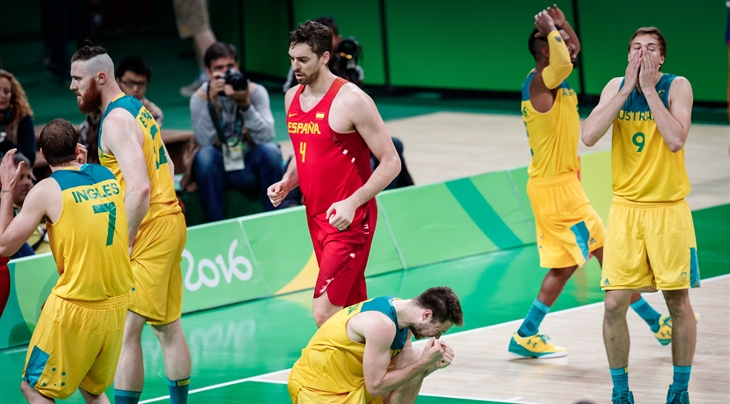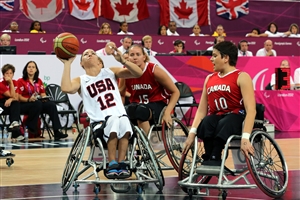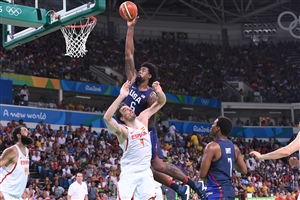
Rio wrap
MELBOURNE (Paulo Kennedy’s View from Downunder) - Never before has a Boomers team played like this, and not since the Atlanta Olympics 20 years ago has the Australian public been so proud and so absorbed in basketball.
The widespread public feeling is that a refereeing misstep denied the Aussies a bronze medal and that has almost added to the story, with people all around the nation - hoops fans or not - sharing their disbelief that such a mistake could be made at such a crucial time.
For that reason, this Boomers campaign will be enshrined in Australian sporting folklore just as much as if Andrej Lemanis' men had taken what most feel was their rightful place on the dais.
For the players though I'm sure it's a different feeling. I suspect it would be easier to live with such a heartbreaking result had it been their own error that had determined their fate rather than someone else's misjudgement.
That's sport though, and all 12 of the Boomers - who all showed their value to the team at one point or another - can rest assured that their efforts as a team won the admiration of an often basketball-indifferent nation.
Remarkable tournament
Apart from too many lop-sided games in the knockout rounds - only Australia v Spain and Serbia v Croatia were in doubt in the final moments - this tournament would have to be one of the best of all time.
Apart from the quality of basketball and the unpredictability of results, there were so many fascinating storylines. Poor Brazil couldn’t shake their tag as the close-game chokers, going 1-3 in single-figure contests. It was sad given how amazing the support was for the home team.
Perhaps the most amazing was Lithuania's capitulation mid-tournament after streaking to a 3-0 start including wins over Brazil and Argentina. From there they were slaughtered by 50 points by Spain, destroyed in the middle quarters by Croatia and then humbled by the Aussies in the Quarter-Finals.
No doubt more details will emerge over time of what transpired in the Lithuanian camp, but it was a sad way for Jonas Kazlauskas' time to end.
France's demolition at the hands of Spain in the Quarter-Finals was also a big surprise after they had defeated Serbia and pushed the USA to the final buzzer. Again, a very sad way for Tony Parker's distinguished career in a blue singlet to conclude.
Then there was Serbia, who for the second straight global tournament staggered into the knockout round and then produced some stunning basketball to burst their way into the gold medal. Also for the second straight tournament, they showed their aggressive and instinctive basketball is no match for the USA - that gold medal slaughter was a sad end to a great tournament.
Of course, while it was sad Manu Ginobili and Argentina's golden generation didn’t go out with one last medal, the farewell Manu received from the thousands of countrymen who were in Rio was one of the most uplifting moments of Rio. He showed on court that he's still got it too, just by the way!
Please indulge me one last time but this is one of best hoops stories you'll ever. Last time, I promise. https://t.co/aAccNqtbp6
— Fran Fraschilla (@franfraschilla) August 22, 2016
Sadness turns to anger
While disbelief and sadness were the common emotions from Australians after the ending of the Bronze Medal Game, the later attempt to explain US referee Steve Anderson's foul call on Patty Mills seemed to stir up anger amongst basketball fans Downunder.
Australian commissioner Billy Mildenhall quoted the game's referee supervisor as saying "the reason (the call) was late was because it was not from the original contact". However, a quick look at the replay clearly shows there were not two separate pieces of contact.
You can not be serious! https://t.co/UeRcftbhyg
— Liam Santamaria (@liam_santa) August 21, 2016
I don't think a referee making a late call is a bad thing at all - if a moment of ponderance helps them make the right decision, then take that time by all means - but providing a justification that is easily shown to be inaccurate has not been received well in this country.
Just as disappointing was the reported comment that the foul was called because as Mills "lost balance he corrected himself and extended his leg". Once again, however, the replay clearly shows the only movement of Mills' leg came as a result of the contact by Sergio Rodriguez's leg.
Referees can make mistakes in the moment, given the speed of the game it is inevitable, but explanations post-game should be precise and I think that is why fans in Australia have reacted so strongly to those comments.
Heart and soul
Mills' tournament will be remembered for that 'foul', but he was the heart and soul of this Boomers team, the one who first made them believe a medal was a real goal, and no one played with bigger Moltens on the way to all-but achieving it.
If you take out the shocking night against Serbia, Mills averaged 24 points per game at 38 per cent from long range, hitting 20 triples in six games despite being tightly guarded on every possession.
He relished taking the tough shots, and just like with Corey Webster and Kirk Penney for New Zealand in a similar offensive system, Mills' ability to make those attempts opened up the floor for the rest of his teammates. He was also a class act all the way through, a true Australian role model.
There was some criticism of Lemanis' last play in the Bronze Medal Game, but had David Andersen squared up and been stronger with the ball, Mills would have been shooting a lay-up to win the game.
Perhaps Lemanis' play had one pass too many - maybe Andersen should have been looking for Mills and not Matthew Dellavedova at the high post, who was supposed to then feed Patty - but the movement in that play was superb and was about to leave Ricky Rubio on an island. If only Andersen had been able to withstand Rubio's fly-by tap of the Molten.
Regardless, that last play should not diminish how people view the performances of Lemanis, Andersen or any other Boomers in Rio, they were outstanding.
Coming up
Over the next two weeks, I will provide my wrap of the on-court efforts of the Opals and Boomers - one a team that appeared to be without a thorough plan, the other a meticulously prepared group whose execution surprised the world.
Paulo Kennedy
FIBA
FIBA's columnists write on a wide range of topics relating to basketball that are of interest to them. The opinions they express are their own and in no way reflect those of FIBA.
FIBA takes no responsibility and gives no guarantees, warranties or representations, implied or otherwise, for the content or accuracy of the content and opinion expressed in the above article.

















